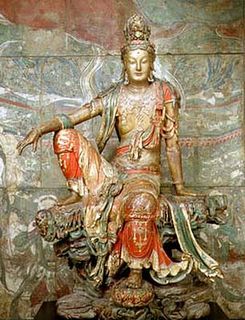The Post Office Adventure
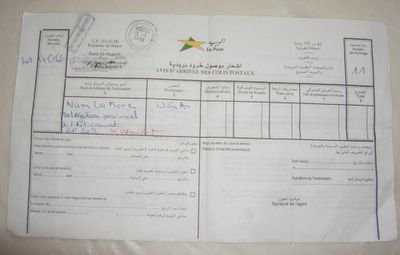 A couple of weeks ago I received a notice from the post office1 informing me of a package from the U.S.A. Though I've received a few boxes since my arrival, all of them have been from the Peace Corps/Morocco office. They have been mostly medical supplies I needed to treat one ailment after another; travel and stress can really nail even the healthiest of persons. Except for allergies and severe hay fever, I never, ever get sick
A couple of weeks ago I received a notice from the post office1 informing me of a package from the U.S.A. Though I've received a few boxes since my arrival, all of them have been from the Peace Corps/Morocco office. They have been mostly medical supplies I needed to treat one ailment after another; travel and stress can really nail even the healthiest of persons. Except for allergies and severe hay fever, I never, ever get sick The postal notice clearly said it was from the U.S.A., so I was excited with questions: Who could it be from? What could be in it? Did Papa Noel forget that he had already sent me a bike? Did the medical staff have to have supplies sent directly from the D.C. office? In a hedonistic fashion, I dreamt that the package contained my "wish list" of things I had taken out from my suitcase, or forgotten, to bring to Morocco. The silent day-dreaming was interrupted by greetings as I walked up to the post office.
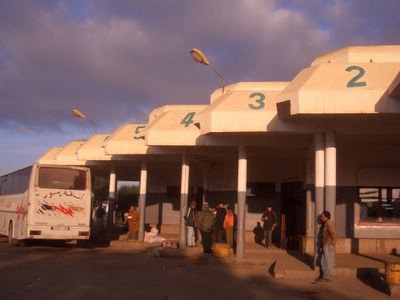 Arriving at the post office and waiting some 30 minutes to talk to the familiar clerk2 about my postal notice, I was sorely disappointed to discover that the package needed to be signed for in-person at the central post office in ancient imperial fortress-city Meknes, an hour away. I thought, "Great, I always like day-trips to Meknes. This gives me a good reason to see the fortress-city again." I set off early the next morning so I could have some time to explore parts of the town before going to the post office. The morning/afternoon looked like this:
Arriving at the post office and waiting some 30 minutes to talk to the familiar clerk2 about my postal notice, I was sorely disappointed to discover that the package needed to be signed for in-person at the central post office in ancient imperial fortress-city Meknes, an hour away. I thought, "Great, I always like day-trips to Meknes. This gives me a good reason to see the fortress-city again." I set off early the next morning so I could have some time to explore parts of the town before going to the post office. The morning/afternoon looked like this:* walked up the main street to Bab Mansour (no tourist on this day) and talked a bit to a man selling terboush [hats] next to those impressive gates; I bought a green/white terboush (but not at tourist price).
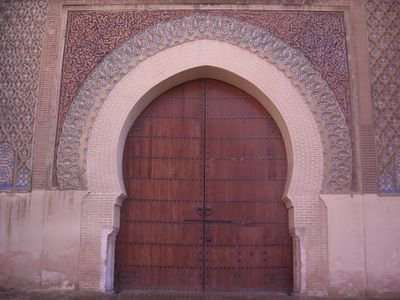
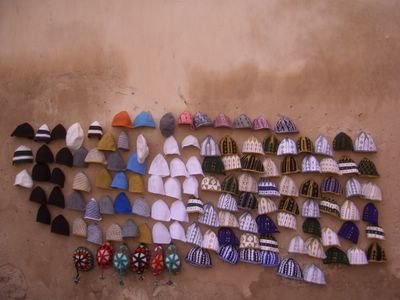
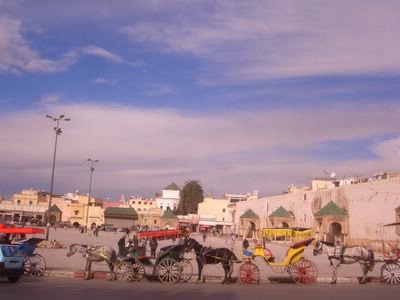
* entertained the thought of taking one of those horse-drawn carriages lining the main street in front of the medina plaza, but decided to enjoy the morning sun and watch store merchants set up their wares and listen to the plaza medicine man talk about the wonders pungent, multi-hued concoctions.
* explored the food, household goods, hardware and electronic sections of the souk; this was an exercise in pricing items, really. I wanted to see if it was worth buying things for my new dar [house] in Meknes or my own town. Taking copious notes and photos, surely I must have played into the conspiracy theory that Peace Corps Volunteers are just really CIA agents3.
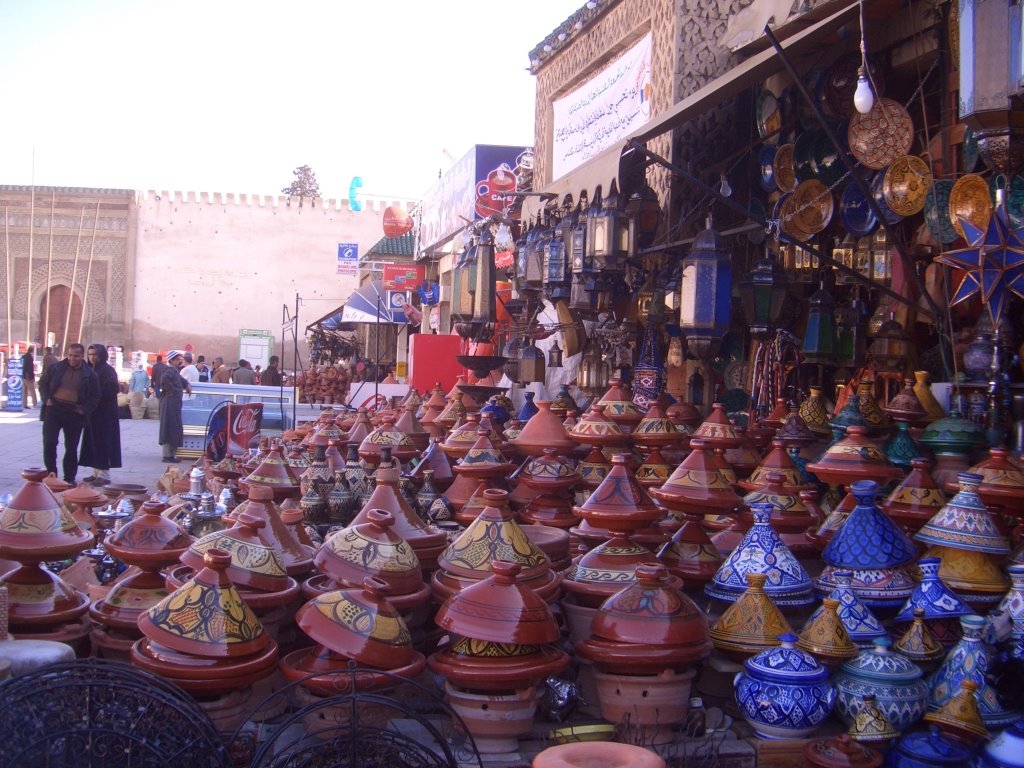
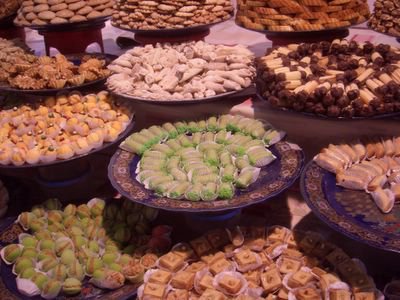
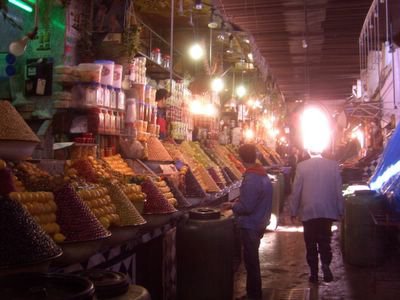
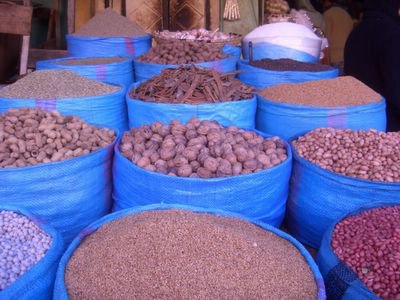
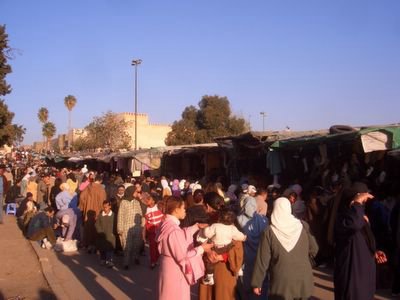

* finished with the souk but not ready for the post office I decided to meander through the labyrinthine fortress-city. I was not worried about getting lost in the maze because it was still early enough in the day for me to retrace my steps if needed -- an added benefit of taking lots of pictures is that I can easily retrace my steps.
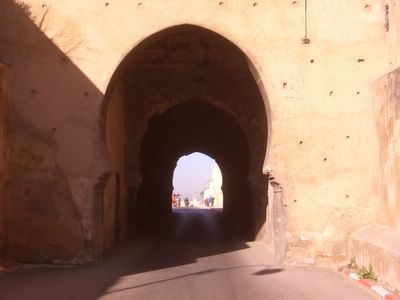
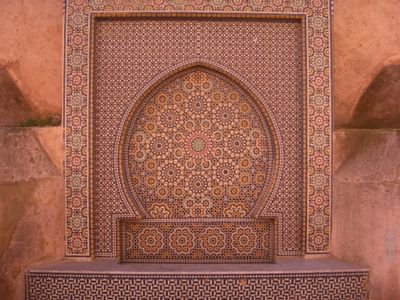
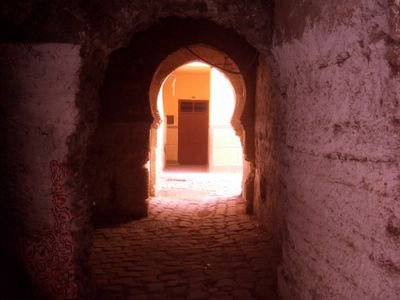
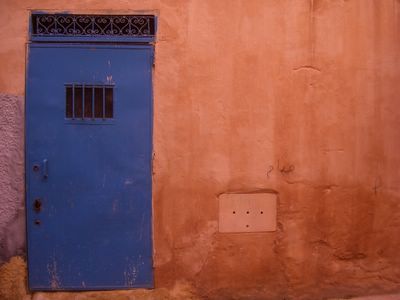
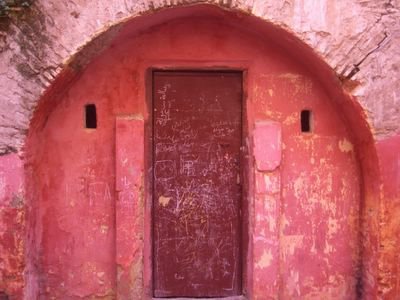
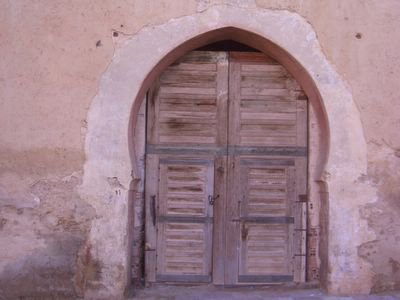
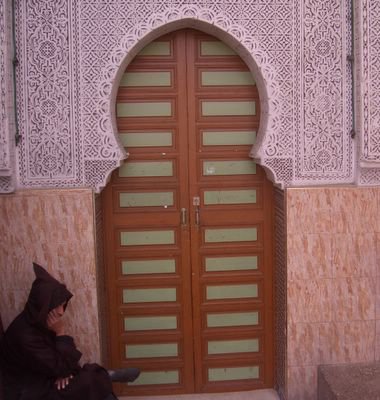
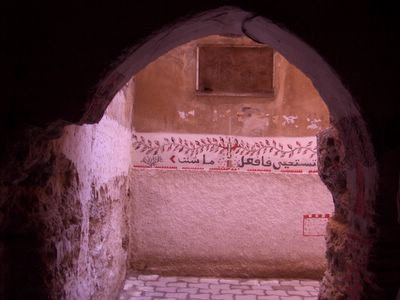
*
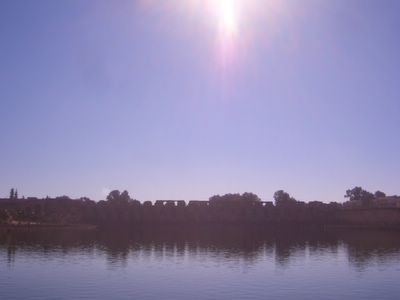 emerged from the maze onto one of the King's Palaces (where photos cannot be taken); the guard said the Royal Family does not spend much, if any, time in Meknes, even if there is a Royal Golf Course, Stadium and Lake4.
emerged from the maze onto one of the King's Palaces (where photos cannot be taken); the guard said the Royal Family does not spend much, if any, time in Meknes, even if there is a Royal Golf Course, Stadium and Lake4.After spending the entire morning walking around Meknes, I thought it prudent to bee-line it to the post office before I got carried away in my wandelust and forgot the reason for the out-of-site leave; Peace Corps is serious about volunteers staying put for two years at their assigned site5. Asking for direction every couple of turns was good language practice. Of course, asking for directions from a dozen strangers got me a dozen different ways to get to the same place; try it in your own town and you'll know what I mean.
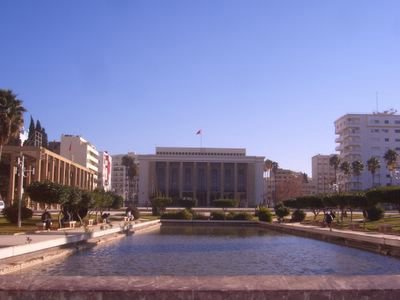 I am eye-witness to the fact that Morocco likes official buildings to be on the grand scale. The central post office for the Meknes region is astonishingly impressive (I thought it was a Macy's department store at first); take my word for it because taking pictures of government buildings is prohibited. In the picture, the post office is to the left of the Hotel DeVille.
I am eye-witness to the fact that Morocco likes official buildings to be on the grand scale. The central post office for the Meknes region is astonishingly impressive (I thought it was a Macy's department store at first); take my word for it because taking pictures of government buildings is prohibited. In the picture, the post office is to the left of the Hotel DeVille.Going to the post office duirng lunch (from noon-ish to two-ish) gave me cart blanc to the service counter. Showing my postal notice to the clerk, I was told I was in the wrong part of the building. WTF?!? Though the building was impressive there was only one set of doors to enter (as far as I could see), so how was it possible for me to be in the wrong part of the building?!? I was instructed to go out the set of doors, turn the corner and follow the building's length until I see a little entrance for package pick-up; she added that I could not possibly miss it as there would be others waiting to claim their packages.
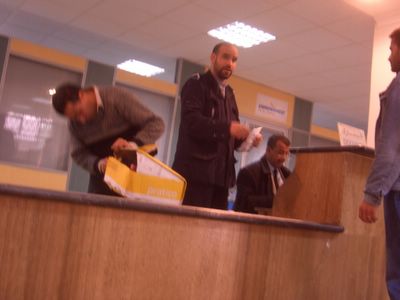 Playing it cool, I strolled down to the package pick-up entrance. The clerk wasn't kidding, I queued up in the mile-long line. I gave the clerk my postal notice and passport, and the postal worker said to just mill about until my name was called. I sat in a corner and read one of the fictions Peace Corps sent, all the while keeping a hawk-eye on my passport on the counter. Having reader's block, I decided to just watch the activities in the room. The postal workers servicing the mob was very efficient. How many postal workers does it take to get a package for someone? It takes four, each has a specialized task:
Playing it cool, I strolled down to the package pick-up entrance. The clerk wasn't kidding, I queued up in the mile-long line. I gave the clerk my postal notice and passport, and the postal worker said to just mill about until my name was called. I sat in a corner and read one of the fictions Peace Corps sent, all the while keeping a hawk-eye on my passport on the counter. Having reader's block, I decided to just watch the activities in the room. The postal workers servicing the mob was very efficient. How many postal workers does it take to get a package for someone? It takes four, each has a specialized task:- * one guy goes to the warehouse to get the package.
* one guy slices open the package, then steps back.
* one guy inspects the package and reports its content.
* one guy records the content and tells the person how much tariff is owed.
 The plain, brown-paper wrapped package was slit open, the content was recorded and I was told I owed 250dh in tariff; content checked as "gift" and declared at US$100 on the manifesto. Mind you had I heard the tariff collector say "Si LaMore, you owe $25 dollars" then it would not have thought twice about paying the tariff; however, saying 250dh (about the equivalent of US$25) is a huge chunk from my Peace Corps living allowance. At this point I considered these options:
The plain, brown-paper wrapped package was slit open, the content was recorded and I was told I owed 250dh in tariff; content checked as "gift" and declared at US$100 on the manifesto. Mind you had I heard the tariff collector say "Si LaMore, you owe $25 dollars" then it would not have thought twice about paying the tariff; however, saying 250dh (about the equivalent of US$25) is a huge chunk from my Peace Corps living allowance. At this point I considered these options:- * not accept the postal package (but why would I not accept a gift from a friend? that's just not Nam-like). I doubt if it would be back on U.S. soil; more likely it would "mysteriously fall off the truck" between the post office and the airport.
* come back another time when I've saved up my allowance money. Not really an option, because the post office is not a storage center - they don't hold packages for more than a week or so. If I didn't get the package now, I doubt if I would attempt to save enough to come back for it; after all, I have a house to furnish (if I ever find one).
* bite the bullet and pay the tariff. I'm still not sure how the tariff was calculated - maybe depended on how many inspectors worked that day? I'll have to ask my local postal clerk, we talk every few days when I come in to inquire about my position on the waiting list to get a postal box.
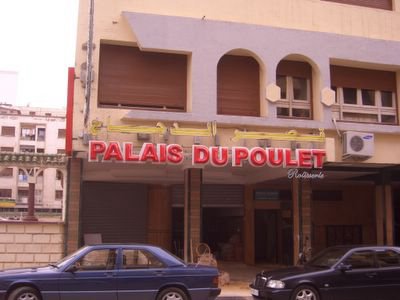 Reluctantly I paid the tariff and, like the Greek titan that is the namesake of the Atlas region, carried the 27-pound package for all to see. A couple of blocks later, I stopped by "Palais du Poulet" (Chicken Palace) for lunch - a nice break from the grilled-sheep-at-every-meal of the last couple of weeks.
Reluctantly I paid the tariff and, like the Greek titan that is the namesake of the Atlas region, carried the 27-pound package for all to see. A couple of blocks later, I stopped by "Palais du Poulet" (Chicken Palace) for lunch - a nice break from the grilled-sheep-at-every-meal of the last couple of weeks.THIS IS THE MOST IMPORTANT PART OF THE ADVENTURE. Commandeering an adjoining, empty table during lunch, I had the chance to look over the postal package in detail. It came from my friend ANN FINNIE, Public Relations Manager for Desktop Products, Hewlett-Packard Company; we became good friends when I worked there years ago. She was one of the few I confided in (a couple of years ago) regarding plans to join the Peace Corps. Jumping from Corporate America to Peace Corps is a move that many corporate-knowledge workers would consider, but not actually "go for it".
~ Ann Finne, PR Manager, HP |
I must have had a He-Man complex, as I decided to schlep the box all around town on my quest to reach the maHatta [bus station]; it would have been much easier to flag down one of the blue-colored petite taxis or white-colored grand taxis7 criss-crossing the fortress-city. The benefits of making my way on two legs instead of four wheels kept me from turning into a popsicle from the cold, dry-air of the Middle Atlas, and afforded me opportunities to casually snap pictures of murals along the trek.
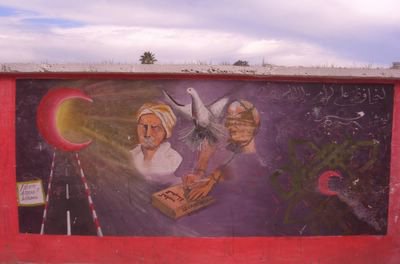
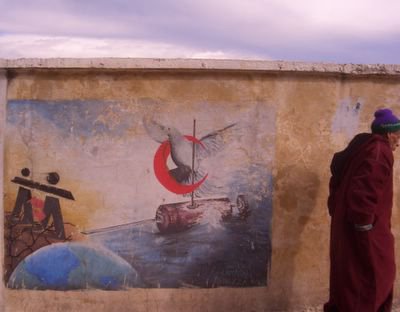
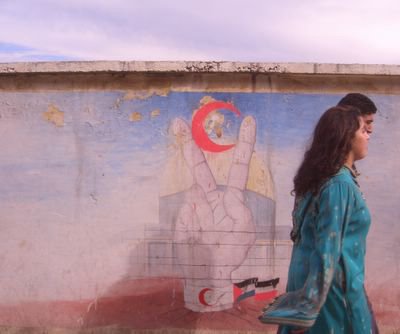
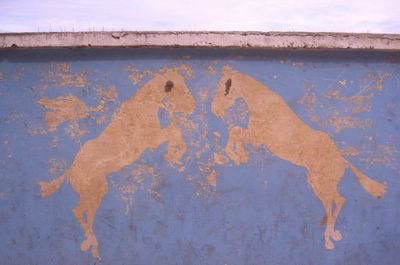
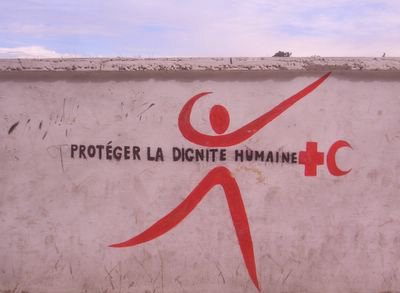
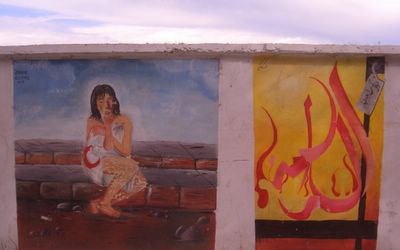
The adventure ended as any epic quest should end: reaching home safely, forever changed from the experience8 and with a story to share.
llah y-3tik l'xir [thank you, when very grateful to somebody] to Ann Finnie.
2. The post office seems always to be crowded with people inside and outside - unfortunately, there does not seem to be any opened windows in that crowded servicing room. The body odor (BO) level in that room can render a camel unconscious in seconds; I've learned to take deep breaths before going in and swallow air like a fish while visiting the post office. I'm sure all the postal workers think I have a breathing problem. They're right.
3. I'm pretty sure the CIA has more important data to collect and analyze than the price of a kilo of spicy olives or a personal terracotta tajine [traditional coned Berber oven] in Meknes; but who knows, maybe there is "chaos-theory" or "butterfly-effect" correlations between houseware, democracy and the price of a crude barrel of oil.
4. I bet it also has something to do with the fact that the Meknes region is known as the "wine-producing region" of Morocco. Though my town/province of Khemisset is part of the Rabat region, I am so glad to be close to Meknes; the country-side will look and smell just like Napa-Sonoma County of Northern California in the Summer/Fall.
5. Peace Corps is generous with the allotted time Volunteers are allowed to for out-of-site leaves; they just need to be approved prior to travel out of the assigned site. This is for Volunteer safety and security.
6. I'll put it in perspective: 100 business cards (four-colors, two-sided printing) cost 100dh (about US$10), and that's a bargain. 100dh can also buy you in Morocco: 10 bootleg DVDs (bet I saw "Narnia" and "Harry Potter: The Goblet of Fire" before you did) or 50 bootleg audio CDs (who wants to hear the latest Whitney Houston tracks?) or four rotisserie chicken meals (complete with fries and a salad) or 10 knock-off Nike ski-caps or 20 kilos (about 45lbs) of oranges or 25 pairs of heavy-duty wool socks or two nights at a 3-star hotel in Meknes or three litres of Meknes-produced red wine (nothing, nothing! beats Trader Joe's Two-Bucks Chuck) or 100 disks of large bread.
7. A legacy of the French occupation are the two types of taxis in Morocco: petite and grand. Petite taxis service riders within a town/city and a petite taxi's color is generally unique to that town: light blue in Meknes, bright orange in Khenifra, egg-shell white in Khemisset, lime green in Azrou, etc. Grand taxis service riders between towns/cities and the color is always a dull white. However, grand taxis do service riders within large towns (like Khemisset)/cities (like Meknes), and cost a fraction of petite taxis; only tourists and bourgeois Moroccans take petite taxis if grand taxis are available.
8. The next time a stranger, especially a foreigner, asks for directions, I will take my time to explain the easiest (not necessarily most direct) route to the destination.
tags: peace corps.africa.morocco
another point of view ...
lol, it reminded me of living, and receiving post, in turkey. but worse than lingerie ... while i was there, some turkish guy had ordered two boxes of (whisper) sexual aids. worse than that, before knowing the contents of said packages, my turkish friend answered a request for someone who spoke english and turkish for translation of receipts with equipment. it was a long slow embarassing checking off the contents of the box ... more than one person dreamed of dying quietly that day.
have fun ... it looks marvellous over there.
kind regards
di
HALE: it was a CRAZY day! luckily, it did not rain until i was steps away from my homestay house [still no dar - but looking every day!]. btw: i'll have to email you about your interest in l'maghreb -- you're not an exiled king looking to make a return, are you?
PERI: i only saw a few murals, was trying to get to the bus station; i'm hoping to spend more time in meknes once i get my housing situation sorted out. also, rabat's so close ...
the potteries are to serve/cook food in. the coned potteries [tajine potteries] are great - you pile meat, veggies and oil/spices in the center and put the whole thing on a burner; about an hour later, it's delicious! the personal tajine pots are about 8" diameter & the big, family ones are about 15" diameter. the base for the family-size tajines also served as a place to knead bread.
these silver pots are not tea pots (as i mistakenly thought at first); they are for washing hands at the table. warm water is poured from the "kettle" as you wash your hands over the "basin". i'll get one for my place, but probably for decor or for other uses (maybe to hold potpouri).
WANDERING WOMAN: OMG, that story sounds so funny - sadly, i can see it happening on a daily basis at the post office! none of my friends better send anything to make me turn red as a cherry, or if they do then i'll completely mis-translate when they come to visit me!
belgium is close by .. come visit! you're welcome to anytime.
ARMANIAC: don't have a hookah-pipe yet, but will probably own a few by the time i leave morocco .. yeah, i'll be using them only for decoration ;-)
That was a good story. It is nice to see that no matter its location the post office is a machine of people paid to slow down and ruin your day.
Hey Nam, I just love those typical Moroccan keyhole styled doors, doorways, hallways, gates or whatever is that called? They are so exotic, my type really.
And I hope you enjoyed your new HP printer from your friend!
MQUEST: you said it! but i just write it off as efficiency :-)
THE DUTCHED PINAY: not sure what that style is called - arabian doors? muslim arch? i'll have to look it up in my art history books. i really like them, too; adds charm and grace to an entry way.
speak up!
Di Mackey
lol, it reminded me of living, and receiving post, in turkey. but worse than lingerie ... while i was there, some turkish guy had ordered two boxes of (whisper) sexual aids. worse than that, before knowing the contents of said packages, my turkish friend answered a request for someone who spoke english and turkish for translation of receipts with equipment. it was a long slow embarassing checking off the contents of the box ... more than one person dreamed of dying quietly that day.
have fun ... it looks marvellous over there.
kind regards
di
Nam LaMore
HALE: it was a CRAZY day! luckily, it did not rain until i was steps away from my homestay house [still no dar - but looking every day!]. btw: i'll have to email you about your interest in l'maghreb -- you're not an exiled king looking to make a return, are you?
PERI: i only saw a few murals, was trying to get to the bus station; i'm hoping to spend more time in meknes once i get my housing situation sorted out. also, rabat's so close ...
the potteries are to serve/cook food in. the coned potteries [tajine potteries] are great - you pile meat, veggies and oil/spices in the center and put the whole thing on a burner; about an hour later, it's delicious! the personal tajine pots are about 8" diameter & the big, family ones are about 15" diameter. the base for the family-size tajines also served as a place to knead bread.
these silver pots are not tea pots (as i mistakenly thought at first); they are for washing hands at the table. warm water is poured from the "kettle" as you wash your hands over the "basin". i'll get one for my place, but probably for decor or for other uses (maybe to hold potpouri).
Nam LaMore
WANDERING WOMAN: OMG, that story sounds so funny - sadly, i can see it happening on a daily basis at the post office! none of my friends better send anything to make me turn red as a cherry, or if they do then i'll completely mis-translate when they come to visit me!
belgium is close by .. come visit! you're welcome to anytime.
ARMANIAC: don't have a hookah-pipe yet, but will probably own a few by the time i leave morocco .. yeah, i'll be using them only for decoration ;-)
Unknown
That was a good story. It is nice to see that no matter its location the post office is a machine of people paid to slow down and ruin your day.
Jo Travels
Hey Nam, I just love those typical Moroccan keyhole styled doors, doorways, hallways, gates or whatever is that called? They are so exotic, my type really.
And I hope you enjoyed your new HP printer from your friend!
Nam LaMore
MQUEST: you said it! but i just write it off as efficiency :-)
THE DUTCHED PINAY: not sure what that style is called - arabian doors? muslim arch? i'll have to look it up in my art history books. i really like them, too; adds charm and grace to an entry way.
speak up!
previous 10 posts:
- Spring in Khemisset
- Aid Kbir: Sacrifice of the Sheep
- Directorial Debut
- Reflections Upon Reflections
- Personal Portal: Morocco
- McHappy in Morocco
- That Time of Year
- Make Mine Khemisset!
- Crossing the Line
- Credit Where Due







